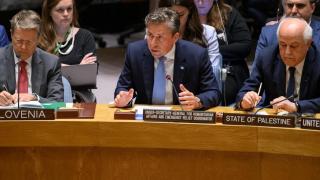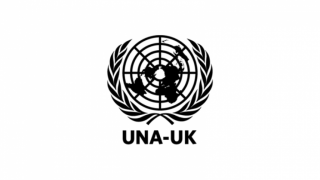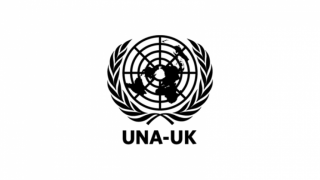
On Tuesday (13 May) Tom Fletcher, United Nations Emergency Relief Coordinator, briefed the Security Council on the humanitarian situation in Gaza asking member states if they would “act – decisively – to prevent genocide and to ensure respect for international humanitarian law?” The UK and its allies must heed this call and not only fully recognise the scale of atrocities taking place daily in Gaza, but take robust and urgent action to stop Israel’s annihilation and annexation of the Strip.
The UN Relief Chief’s remarks came in the wake of Israel’s cabinet approving plans for “conquering Gaza” in which the Israeli Defence Force (IDF) will expand its operations to seize and occupy land in the Gaza Strip and forcibly displace much of the Palestinian population. An Israeli government minister stated “Gaza will be completely destroyed” and that Israel would “apply sovereignty to the West Bank” before the government finishes its current term in October 2026. In parallel, Prime Minister Netanyahu’s Security Cabinet has approved a proposal for Israel to take control of humanitarian assistance in Gaza. According to the UN the plan “contravenes basic humanitarian principles” and “appears to be a deliberate attempt to weaponize the aid.”
Since unilaterally breaking the January ceasefire Israel has continued to bombard Gaza – peaking with 600 casualties on 18 March alone - and maintained a total blockade of aid and food to the Strip. The latest report from the Integrated Food Security Phase Classification (IPC) estimates 500,000 people in Gaza are now facing starvation. According to UN experts, these acts reflect a pattern of genocidal intent and demand urgent international action. They have warned states “must act now to end the violence or bear witness to the annihilation of the Palestinian population in Gaza – an outcome with irreversible consequences for our shared humanity and multilateral order.”
These plans for an unconscionable escalation of Israel’s ongoing violations of international law, including ethnic cleansing and acts of genocide, as well as the “manmade and plolitically motivated starvation” in Gaza, necessitate an urgent and robust response from the UK, its allies and all other parties to the Genocide Convention. The UK Government (HMG) has stated that they “strongly oppose the expansion of Israel’s operations” and that “any attempt to annex land in Gaza would be unacceptable.”
However, sentiment is not enough, and these words must be followed by clear, decisive actions. We reiterate our call that the UK must immediately end weapons sales to Israel and implement a full arms embargo. Further HMG must unequivocally support international efforts for accountability, including taking steps to comply with the International Court of Justice’s (ICJ) 2024 advisory opinion on the legal consequences of Israel’s policies and practices in the Occupied Palestinian Territories (OPT), which is yet to do. This necessitates the UK halt military and diplomatic support to Prime Minister Netanyahu’s government, sanction Israeli officials and review bilateral agreements. The failure of successive governments to take these steps casts serious concerns over the UK’s commitment to upholding international law, and the UK risks complicity in these ongoing violations.
HMG in court to defend ongoing arms sales
On 13 May, while the OCHA Chief briefed member states at the UNSC, the High Court in the UK began a crucial four-day hearing to examine the legality of British-made components supplied for the F-35 programme — a multi-nation fighter jet platform that plays a central role in Israel’s military operations in Gaza. Around 15% of each F-35 is produced in the UK. Israel obtains key parts through this global supply chain and uses the jets in repeated airstrikes across Gaza — including in strikes on civilian areas, hospitals, and designated “safe zones,” such as the attack on Al-Mawasi, which killed 90 people and injured hundreds more.
In a new report, published this month by Palestinian Youth Movement, Progressive International, and Workers for a Free Palestine, research suggests UK companies have persisted in exporting thousands of military items, including munitions, to Israel despite the UK government halting key arms export licences to the country in September 2024. The study, analysing Israeli tax authority import data, raises grave questions around the lack of transparency in the UK’s arms exports regime as well as the legality of UK arms sales to Israel.
The UK government has issued statements condemning the blockade of Gaza, rejected any forced displacement of Palestinians, loss of territory within the Gaza Strip, or annexation by Israel. In April, the UK renewed calls for Hamas and Israel to return to talks, for the release of hostages, and expressed concern over Israel’s conduct in the occupied Palestinian territories. Yet these declarations stand in stark contrast to claims by the organisations (Al-Haq and the Global Legal Action Network supported by Amnesty International UK and Human Rights Watch) bringing the Judicial Review highlighting the UK government’s ongoing authorisation of arms exports — including components for F-35 fighter jets — that are being used in the very attacks it claims to oppose.
This disconnect undermines the UK’s credibility and weakens the moral authority of its foreign policy. As long as military exports continue, Britain cannot plausibly claim to be a neutral party promoting peace or international law. If the UK is serious about upholding its legal obligations and restoring its credibility on the global stage, it must go beyond rhetorical condemnation. This starts with a comprehensive arms embargo on Israel, including ending the export of all components linked to the F-35 programme.
Read more:
- Read the full statement from the Foreign Secretary
- Read the global call for an immediate ceasefire
- See UNA-UK’s resources and write to your MP
- UNA-UK's head of policy calls on the UK to support Gaza ceasefire resolution
- UNA-UK statement calling on the UK to halt arms exports to Israel
- UNA-UK statement on the devastating violence in Gaza and Israel
- Statement in support of the UN Secretary-General from former British senior officials
- UNA-UK statement commending commitment to address the use of explosive weapons in populated areas
Photo: Tom Fletcher (centre), Under-Secretary-General for Humanitarian Affairs and Emergency Relief Coordinator, briefs the Security Council meeting on the situation in the Middle East, including the Palestinian question. Credit: UN Photo/Loey Felipe






